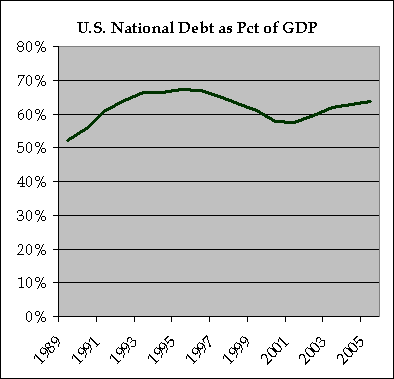Every other blog in the world is spending today pontificating about the change in control of the U.S. House (and probably the Senate). Talking about how it will impact the markets beyond the next week or so is speculative at best. I say this because the Democrats ran primarily on a anti-Iraq/Bush platform, not really on any sort of economic policy. At one time, the Democrats were the tax and spend party, promoting transfer programs and heavy regulation. But the last really successful Democratic politician, Bill Clinton, spent his years lowering the deficit, reforming welfare, and getting NAFTA past. So A) I think the focus will remain on Iraq, possibly creating neglect on other issues, and B) We don't know what direction the Democrats are going to head since they never told us.
On this blog, however, we talk about the bond market. Since the budget deficit was an issue that caused at least some typical Republican voters to switch sides in 2006, I thought today's entry could focus on the so-called crowding-out effect.
The crowding-out effect is when government borrowing causes higher interest rates, increasing the cost of private investment activity. With the increased cost, some amount of private investment is forgone, hence deficit spending by the government results in "crowding-out" of private activity. Some argue that deficit spending is therefore economically harmful. They either argue that government spending is inherently inferior to private spending, or that any stimulus from the deficit spending would be offset by the crowding out effect.
We know that, all else being equal, if the government borrows more, interest rates will rise. Its simple supply and demand, the government demands more money (or supplies more bonds) and therefore the price of money (interest rates) must rise. So it would seem as though the crowding out effect is pretty obvious.
However, academics looking for an actual impact on the economy from the crowding out effect struggle to find one. I think this is for a couple reasons. One is, many factors influence interest rates, so trying to isolate just one is very tough. Second, the government has changed their borrowing strategy at various times in history, so at one period they may borrow more long-term and another more short-term, which would have different impacts on interest rates.
I think the biggest reason why the crowding out effect is hard to observe is that the national debt as a percentage of GDP isn't that volatile. Here is a graph of same.
The figure increased a bit during the 1991 recession/Gulf War, decreased during the capital gains tax boom of 1999-2000, and increased again during the Iraqi War. But overall, not that volatile. In addition, government spending does encourage some degree of private investment, e.g., the government awards a defense contract to Boeing, so Boeing expands its production capacity. So combine the relative stability of Federal debt, and the mitigating impact of encouraging some degree of private investment, and it turns out the crowding-out effect doesn't have much effect on interest rates in any given year. I'd say more likely that the crowding out effect has a fair-sized impact, its just fairly constant from year-to-year.
That being said, I think there is merit to the idea that private investment is better for the long-term prospects of the economy than government spending. The reason why savings/investment is important for an economy is to replenish our capital stock (i.e., keep factories in working order), and to expand productive capacity (i.e., build more factories). If we have no investment, then our ability to produce more goods to keep up with population growth is hampered. That would cause per-capita income to decline.
Some government spending programs are for infrastructure, which are important long-term investments. But much of government spending has no positive long-term impact on productive capacity of the economy. For example, when the government buys more tanks, the goal is to defend our borders not to expand productive capacity. Defense is an attempt to maintain the status-quo, and while obviously important, the economy would be better off in the long-run if we didn't have to spend as much. We spend on defense because we have to, not because we want to. Similarly, transfer payments (e.g., social security, medicare), don't expand our productive capacity at all. Mind you, this isn't a political judgment about the merits of transfer payments, rather a statement of fact about the nature of these payments.
So generally its up to private investors to build new factories, invent new products, etc. Its clear that federal deficit spending has some impact on interest rates and therefore crowds out some level of private investment. Plus, you ultimately cannot keep spending more than you're bringing in, the compounding of interest will eat you alive. So on the balance I'm for lowering the deficit. But the deficit problem does get way too much play as an economic issue among both politicians and the media.
Wednesday, November 08, 2006
Crowding out effect
Subscribe to:
Post Comments (Atom)



2 comments:
really good article...Im a college student trying to learn more about the crowding out effect.
Thanks for the kind words.
Post a Comment